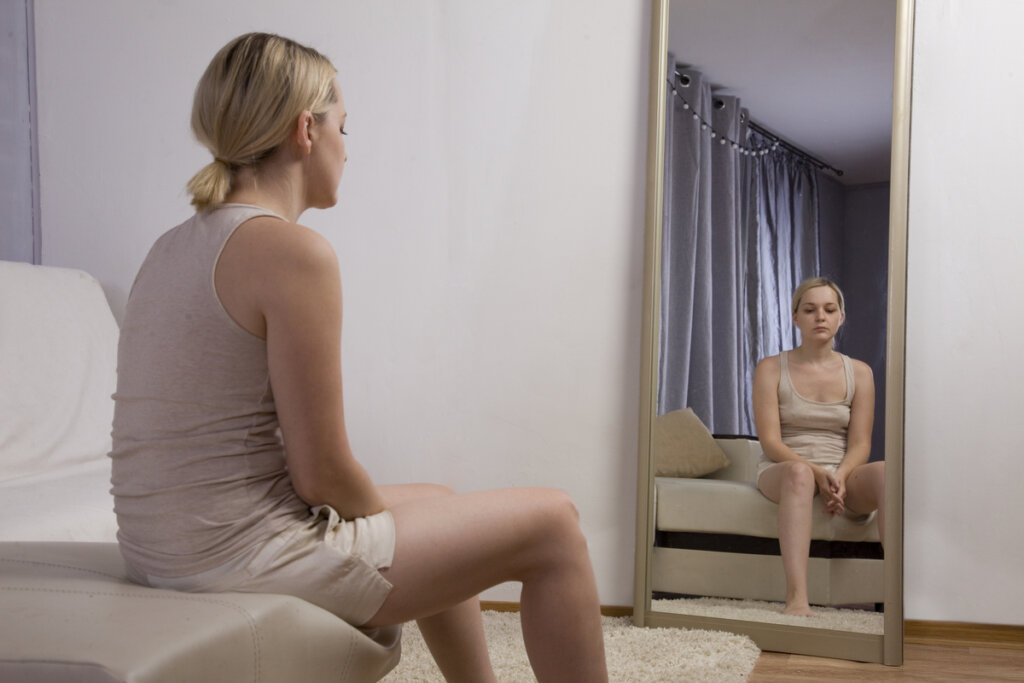How to Overcome a Distorted Body Image


Written and verified by the psychologist Andres Camilo Espinosa Poveda
The body is the vehicle in which you travel through life. Therefore, it’s natural for you to care about how you look. However, a problem occurs when your body image becomes distorted, generating discomfort that threatens to become your shadow.
Indeed, a poorly adapted image of your body can become a real burden. In addition to making you spend a great deal of energy on changing your image, it can also make you feel insecure and even fearful.
The way you see yourself
You live your life, interpreting the reality that surrounds you. You’re constantly creating and updating theories about the functioning of the world, in which you include yourself. One of your main tasks is to frequently update ideas about how you are, your abilities, dreams, ideas, strengths, weaknesses, etc. Also, ideas about your body image.
The image that you have of your body is rooted in really early experiences, opinions of people close to you, the standards of beauty to which you’re exposed, and other information that you obtain through your senses. All of this information is consolidated to form your body image. It’s with this image that you face different situations in your life, from day to day.

Distortion in body image
A problem arises when the image that you form in your mind is too far from reality. It can happen due to two factors, which, when combined, end up causing a great deal of damage.
First of all, the interpretation you make of your body isn’t entirely accurate. This kind of misinterpretation happens with many things. Your brain integrates information about reality, but that information doesn’t always perfectly match the facts.
Your senses provide data about your body. What you see in the mirror and your proprioception. However, in this kind of interpretation, certain information is privileged over another, creating a disproportionate image.
The second factor concerns your need for a positive or negative assessment. As a rule, you tend to interpret information on a scale of good or bad, avoiding neutral points.
Thus, the body image that you build will have a predominantly non-relative positive or negative assessment, despite the fact that the information on which it’s built is anything but absolute.
As an aggravating factor, your brain tends to give more value to negative experiences than positive ones. Therefore, a single experience can make you value your body as ‘bad’.
The consequences of a distorted body image
These two factors can lead to the body image you form not only not matching reality, but also being widely distorted and affecting your mental health. Among the symptoms that may indicate that you have a distorted body image is:
- Continuous and intense feelings that others are looking at those parts of your body that you least like.
- Investing too many resources, including mental ones, in trying to hide your supposed defects.
- Because you’re continuously comparing yourself with others, you tend to heed criticism and ignore compliments.
How to deal with a distorted body image
Treating a distorted body image requires a multi-pronged approach.
Cognition
The cognitive part of your attitude is perhaps the easiest to address and the one with which you should start. Understanding that the perception you have of your body isn’t one hundred percent real is key.
It’s about accepting that the image you’ve formed may be wrong, even if your brain and your senses tell you otherwise. Accepting error and relativity in your ideas can bring a great deal of relief and take a whole weight off your shoulders.
From the cognitive sphere, you can also dismantle harmful value judgments in terms of good or bad, understanding that there’s no single standard of beauty and that what’s truly correct is to accept the body you have.
Through reflection and meditation, you can discover the hidden ideas that lead to distortions in your body image and gradually deconstruct them. You can’t prevent your brain from processing information the way it does, but you can be aware of it and build healthier cognitive schemes.
Emotion
The emotional realm is more difficult, as it often escapes your conscious control. Indeed, you don’t directly control the way you feel, but you can manage your emotions. In addition, you can recognize the anxiety and discomfort that your appearance causes you, and then try to build a new image based on your positive experiences.
You can’t control what others think when they see you, but you can accept yourself and think about your body on positive terms. The idea is to create a positive emotional charge related to your body, for which it’s important to focus on favorable and reliable concepts such as self-acceptance, rather than on the opinion of others.
Keep in mind that your body can change, as can the people you meet, but the acceptance that you give yourself should be constant, to be a stronger foundation for your emotions.

Conduct
Finally, the behavioral part depends largely on the previous two to function correctly. If you haven’t changed your cognitive schemes and haven’t built a healthy emotional base, your behavioral efforts might work against you, thus increasing your anxiety. On the contrary, if you’ve put your thoughts and feelings in order, the behavioral sphere can be productive and even fun.
Once you’ve accepted yourself, you can start to take action to look after your body. Exercising, taking care of your diet, choosing clothes that you like, all of this can increase your self-esteem and improve your body image, as long as it’s not motivated by anxiety.
When you abandon society’s absurd beauty standards and the desire to please others, activities like exercise are self-motivated and can help you feel a great deal better, as well as improve your overall health.
Body image distortion can cause considerable damage. In fact, it can reach a point where your individual resources are no longer sufficient to implement adequate coping strategies. If you reach this stage, you must seek the help of a professional.
All cited sources were thoroughly reviewed by our team to ensure their quality, reliability, currency, and validity. The bibliography of this article was considered reliable and of academic or scientific accuracy.
- Baños, M. & Perpiñá, C. (1990). Distorsión de la imagen corporal: un estudio en adolescentes. Anales de Psicología.
- Estévez, M. (2012). Relación entre la insatisfacción con la imagen corporal, autoestima, autoconcepto físico y la composición corporal en el alumnado de segundo ciclo de educación secundaria de la ciudad de Alicante. Universidad de Granada.
- Sepúlveda, A. Botella, J. & León, J. (2001). La alteración de la imagen corporal en los trastornos de la
alimentación: un meta-análisis. Psicothema. - Vaquero-Cristóbal, R., Alacid, F., Muyor, J. M., & López-Miñarro, P. Á. (2013). Imagen corporal: revisión bibliográfica. Nutrición hospitalaria, 28(1), 27-35.
This text is provided for informational purposes only and does not replace consultation with a professional. If in doubt, consult your specialist.








